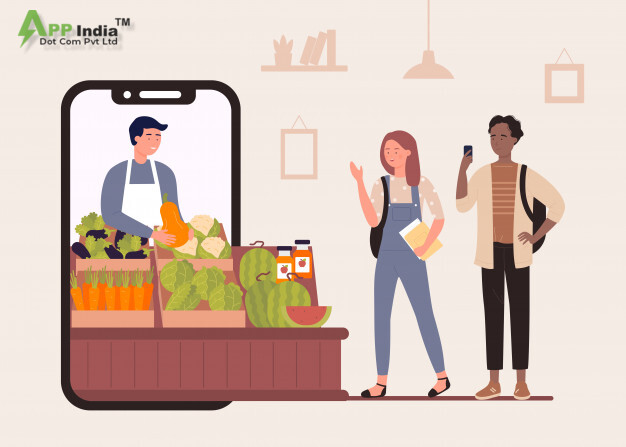How Grocery Apps are Game Changers for Retailers
by admin
| July 31, 2024
Online grocery shopping has been extremely popular for the last four years. Today, big grocery store chains provide mobile apps to their customers for easy ordering and delivery.
Third-party companies also help shoppers get their food delivered to their houses. Convenience and efficiency become top preferences for digital grocery purchasing.
Mobile apps, which include delivery, digital coupons, and shopping lists, allow customers to prioritize convenience, value, and personalization.
Grocery buying via a smartphone app has become more popular and is in high demand now. According to a new survey, two in five consumers prefer buying groceries through an app rather than in-store.
Grocers who successfully use iOS and Android mobile apps need information of their customers while also opening up new revenue sources via features such as purchase history and customer habits.
Grocery apps are one of the most exciting retail technologies, transforming how customers order food online and how businesses operate.
Let’s look at how these applications are changing the retail industry and why they are a game changer for businesses.
The Growth of Grocery Apps
Grocery app usage has increased a lot in recent years. According to a recent survey, online grocery sales are increasing rapidly. But what makes it a trend?
First, people prefer convenience. So, Grocery applications allow them to shop from their own homes or from any place they want.
Second, the pandemic boosted the growth of online purchasing as people depend on internet platforms for their everyday requirements.
Apps like Instacart, Walmart Grocery, and Amazon Fresh have become household brands, providing an easy shopping experience.
The Benefits of Grocery App
Increased sales and revenue
Grocery applications provide an abundance of opportunities for retailers. Retailers increase sales in high amounts by reaching out to customers outside of their physical sites.
The software platform supports upselling and cross-selling, which encourages users to try new products and add additional things to their carts.
Improve Customer Experience
Customer experience is important in retail for the growth of business. So, these apps provide personal recommendations based on a customer’s buying behavior, and help them in finding exactly what they need.
Shopping becomes much more interesting when you receive special discounts and offers that will according to the choice of the consumers.
Improved Operational Efficiency
Grocery apps do more than just sell things; they also aid with operational efficiency. Real-time inventory management allows merchants to optimize stock levels, prevent waste, and make sure popular items will be always accessible.
Data analytics from app usage provide information about customer behavior, allow businesses to make better decisions.
Competitive advantage
In today’s competitive industry, staying ahead is important for businesses. Grocery apps help retailers get an advantage by increasing consumer loyalty through personalized services and innovative marketing techniques. Engaging customers with loyalty programs and unique app-only promotions strengthens the retailer-consumer relationship.
Challenges and Solutions
There are many challenges that retailer has to face when they grocery apps for marketing. Such as technical problems, early expenditures, and staff training, etc.
However, these challenges can be fixed. So, hiring the best technology partner, investing in user-friendly design, and providing strong customer support will help in a smooth transition.
Retailers should also educate their teams and customers on how to use the app easily. So, they can use the grocery app effectively without any effort. Furthermore, for more information company should focus on providing learning videos to consumers for easy shopping.
Future Trends
The future of food ordering applications seems optimistic, with upcoming technology expected to improve the shopping experience even much better.
Artificial intelligence, virtual reality, and augmented reality are all expected to play important roles in the development of grocery apps.
For example, augmented reality can let shoppers see things in their kitchens before purchasing, and artificial intelligence can provide even more exact recommendations.
Retailers must be updated about these changes to remain competitive. And they also focus on matching the desire of the customer expectations.
Conclusion
Grocery applications are the best choice for super marketing and retailing, providing benefits such as an increment in sales, a better customer experience, and improved operational efficiency.
By embracing this digital revolution, retailers can stay ahead of the competition and meet the changing expectations of customers.
 Development Services
Development Services Technologies
Technologies ICO
ICO ICO Marketing
ICO Marketing










